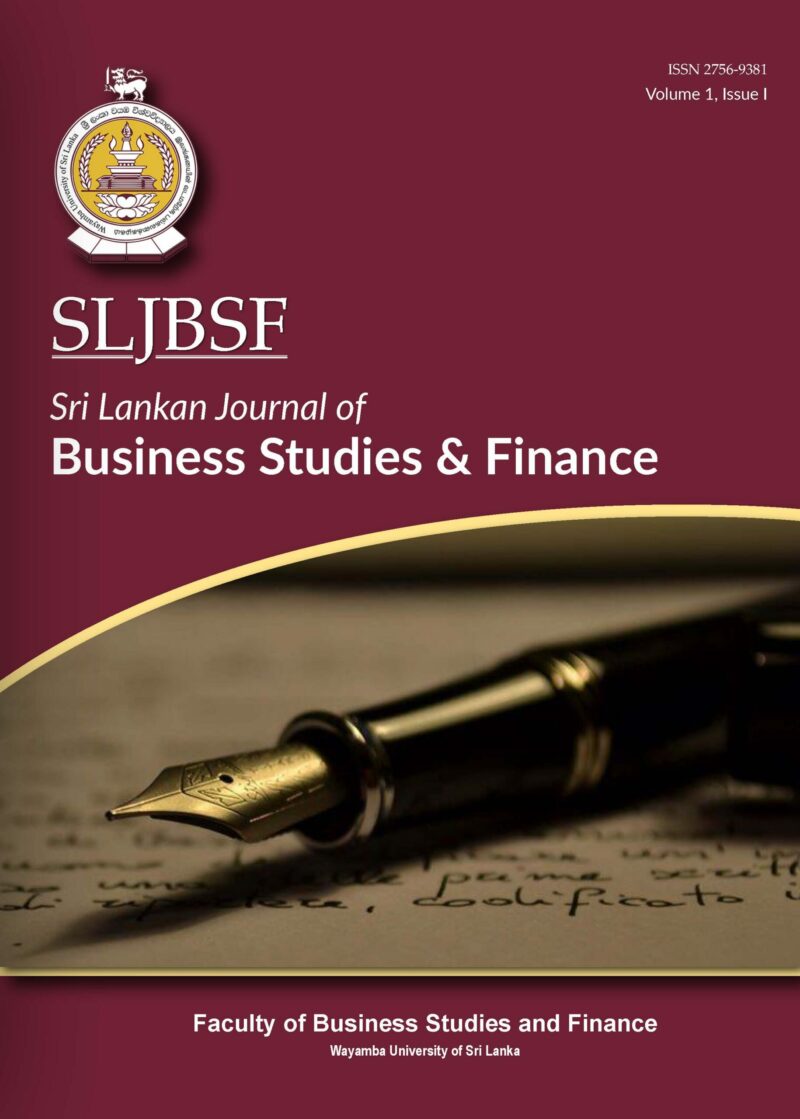Sri Lankan Journal of Business Studies and Finance
Manuscript Preparation
Sri Lankan Journal of Business Studies and Finance (SLJBSF) will publish papers written only in English. Authors are advised to make sure that their manuscripts are in standard written English. All manuscripts should be compiled in the following order: title page; abstract; keywords; main text; acknowledgments; references; appendices
Manuscript style and format
Times New Roman 11-point font and A4 page setting should be used. Page numbers should be centered on the bottom margin. All margins should be one inch. Manuscripts should be double spaced.
Manuscript preparation Title Page
The title page (first page) of the manuscript should include the title, the name(s) and affiliation(s) of the author(s) and their postal address(es), phone number(s), and e-mail address(es). It’s better if the author(s) can include the ORCID number (register by visiting https://orcid.org/) of the corresponding author. The title should be in bold type, upper case, single-spaced, and centered across the top of the first page, in 14-point Times New Roman font. Other details should be single-spaced and centered below the title. In the case of more than one author, the corresponding author should be indicated with an asterisk mark. Please note that the author name(s) must not appear anywhere else in the manuscript except on the title page and the reference list (if cited).
Abstract
The second page should begin with the title of the paper followed by a one-paragraph abstract of not more than 250 words and 3-5 key words. The abstract should include, in brief, the objectives of the research (i.e. knowledge gap being addressed), methods adopted, major findings, and conclusions. It’s better if the authors can include the Journal of Economic Literature (JEL) classification number(s) below the key-words.
Text
The text of the papers should begin on page 3. All body paragraphs should begin with a paragraph indent and be fully justified. Wherever possible, authors should arrange the manuscripts in well-defined sections as appropriate for their work, such as introduction/background of the study, review of literature, context and methods of the study (when applicable), results and interpretations, and discussion and conclusion.
References and Appendices, on separate pages, should be arranged at the end of the manuscript. Page numbers should continue through all pages of the manuscript, including References and Appendices.
Manuscripts should be up to a maximum of 8000 words in length. This includes all text, for example, the structured abstract, references, all text in tables, and figures and appendices.
Headings
SLJBSF allows authors to use three levels of headings. First-level headings should be flushed left, in bold type 12-point Times New Roman font; the first letter of main words should be in upper case. Second-level headings should be flushed left in bold, italics 11-point Time New Roman font; the first letter of main words should be in upper case. Third-level headings are paragraph headings, which should be indented and in italicized 11-point Times New Roman font; the first letter of the heading should be in upper case.
Tables
Tables should be numbered consecutively using Arabic numbering (Table 1, Table 2, etc.) and must have corresponding references in the main text. Tables should also have appropriate and concise headings. Tables should contain only horizontal lines and each should be placed immediately after the paragraph in the text containing the first reference to it. Tables of figures should be created in the paper
and computer output (e.g. SPSS output) should not be copy-pasted. Any tables not based on the authors’ original data should have source notes with corresponding references appearing in the reference list.
Figures and illustrations
All figures and illustrations, as in the case of tables, should be numbered consecutively as ‘Figures’ (Figure 1, Figure 2, etc.) with corresponding references in the main text. Figures should also have appropriate and concise headings. Graphs should be presented as camera-ready, using black ink only. Each figure should be placed immediately after the paragraph in the text containing the first reference to it. Any figures not based on the authors’ original data should have source notes with corresponding references appearing in the reference list.
Conflict of Interest
All submissions should include a statement declaring any personal relationships that could cause a potential conflict of interest. Any funding sources should be properly acknowledged and should include a statement whether such funding could lead to a potential conflict of interest. This statement should be presented at the end of the main text prior to the list of references. Where there is no conflict of
interest, this should be stated.
Acknowledgment
If authors wish to acknowledge financial support or any other assistance, a note can be added below the statement on conflict of interest prior to references.
References
SLJBSF uses American Psychological Association (APA) style guide (Edition 6) for both in-text citations and reference lists. I available include the Digital Object Identification (DOI) number also in the reference. The reference list should be presented at the end of the manuscript and the entries should be double spaced.
Appendices
Any appendices should present after the list of references. They should be numbered consecutively in Arabic numerals (e.g. Appendix 1, Appendix 2, etc.). All appendices should be referred to inappropriate places in the main text.


